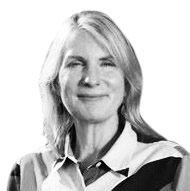It started with the prayers. He’s our president, after all, so the call to pray for Donald Trump seemed harmless enough. The nondenominational, charismatic church I’d been attending had never been political—that wasn’t our focus. We had a multi-racial, socio-economically diverse congregation. A food bank. A prison ministry. A large banner on the side of our modest brick building read: “Experience God’s Love.” And I had.
In March of 2020, with the outbreak of COVID-19, services went online. In May, our governor, Arizona’s Doug Ducey, allowed formerly shuttered businesses to reopen. Places of worship (though technically having been free to meet all along) could resume limited in-person services. I opted to watch online from the safety of my home.
As the election drew nearer, I noticed a change. Sermons took an increasingly martial tone. We were in a “spiritual battle.” Dark forces had been unleashed upon our nation. Prayer warriors must “lock shields” and “keep up the offensive.” The pastor likened himself to Paul Revere, a patriot “sounding the alarm.” Yes, love was important, but we weren’t supposed to just “sit around and sing kum-ba-yah.”
For too long, he said, the church has been twiddling its thumbs. Enough of this namby-pamby stuff. We were in a fight for our nation’s future. It was good versus evil. Good in the form of those who would take a stand against abortion. Evil in the form of those in favor of it. Although we were not explicitly told to vote for Donald Trump, it was hard to miss the messaging. A Latina fellow congregant asked me, “Is it wrong to be a Democrat?” “Of course not!” I answered. Jesus never gave his followers a political litmus test; on the contrary, he said, “My kingdom is not of this world.”
Although the pastor acknowledged the seriousness of the virus, as the months wore on, the in-house attendees, who tended to be the older, whiter part of the congregation, seemed uninterested in following protocols. As I sat on my front porch, watching the sermons on my laptop, I could see that most had stopped wearing masks. Several congregants had shared “The Plandemic” video on Facebook.
In a group text I was a part of, one woman maintained that the virus was a “Democrat hoax” that everyone knows will magically disappear after the election. To wear a mask is to be muzzled, she said. A sinister “they” seeks to silence the voice of the church. Increasingly, I heard members use buzzwords like “the radical left,” and allude to the troubling machinations of Big Pharma, Big Media, and Big Tech.
The Charismatic stream of Christianity to which I belong values individual ecstatic experience. At its best, it honors the mystery of what it means to be human and experience the divine. At its worst, it is undiscerning, subject to wishful thinking, its followers easy marks for con men and frauds. We’d found a strange bedfellow in Donald Trump. Many so-called Christian prophets, whose names were familiar to my fellow congregants, saw their media platforms and influence grow under the president. Many of them prophesied that Donald Trump would win his second term in a landslide.
Yet the results of the Nov. 3 election were clear: the Democratic candidate, Joe Biden, won with 306 electoral votes and over 80 million popular votes, the most in our country’s history. Even so, Donald Trump did not concede. In his book The Cult of Trump, Steven Hassan details how Trump uses cultic techniques such as lies and fear to destabilize and control. He speaks in simple, hypnotically rendered phrases: “Believe me,” the president has continually repeated, “the election was rigged. Believe me, there was massive fraud.”
Two Sundays after the election, I heard similar words echoed from the pulpit. We know, the pastor said, there was massive fraud. The election was rigged. I listened, incredulous, as he told of Hugo Chávez and Dominion voting machines. I immediately emailed him to express my concern. Was this the church of Jesus Christ, or the church of Donald Trump? He responded, assuring me that “liberals like me” were always welcome, but at the core, the church was conservative. And yes, he said, the church was pro-Trump and America First.
I felt like I’d been the victim of a bait-and-switch. Yet upon reflection, I realized these changes had been building over time.
Two weeks later, the pastor, his wife and numerous members of the congregation tested positive for COVID-19. As I write this, a woman who’d been on a ventilator for almost two weeks died. A young man with untreated diabetes is now also on a ventilator, fighting for his life. Several others are hospitalized.
During the latest (now online only) sermon, the worship leader filled in for our sick pastor. He said, in a gentle voice, maybe we’ve gotten off course. Maybe it’s time to get back on track. It’s time to remember who we are, and what really matters. He seemed to be saying, at least to me, that maybe that “love stuff” is what we need after all.
Especially now, when, whether we like it or not, we’re forced to face up to Big Reality.
Elizabeth Brown has taught writing at the University of Arizona’s Eller School of Business and worked as a pastoral counselor. She currently writes from her home in Tucson, Arizona. Her newest short story, “In Your Book of Paintings” is upcoming in Image Journal.





